Posts Tagged ‘Bled’
PEN Journey 37: Bled: The Tower of Babel—Part Two
PEN International celebrates its Centenary in 2021. I’ve been active in PEN for more than 30 years in various positions and now as an International Vice President Emeritus. With memories stirring and file drawers of documents and correspondence bulging, I am a bit of a walking archive and have been asked by PEN International to write down memories. I hope this personal PEN journey will be of interest.
At PEN’s 71st World Congress in June 2005 over 275 writers from 88 PEN Centers gathered from around the world in the idyllic setting of Bled, Slovenia where history had been made 40 years before. In 1965, PEN had held its Congress in Bled, the first in Eastern Europe since the Second World War. Russian writers visited PEN for the first time. At that 33rd World Congress, American playwright Arthur Miller, who’d recently passed away in 2005, had been elected the first and only American President of International PEN.
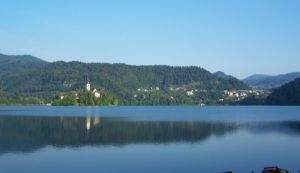
Lake Bled in Bled, Slovenia, site of PEN International’s 71st World Congress, 2005
In 2005 the global dynamics had changed. PEN now had active centers in most of the countries in the former Communist Eastern bloc, including in Russia. The European Union (EU) was in its ascendancy; 2005 marked Slovenia’s accession into the EU. Globalization was bringing benefits but also threats to the cultures of smaller countries.
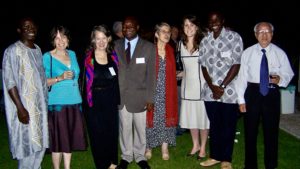
Reception 71st PEN Congress in Bled, 2005. L to R: Frank Asare Donkoh (Ghana PEN), Jane Spender (Program Director PEN International), Joanne Leedom-Ackerman, (PEN International Secretary), Alfred Msadala (Malawi PEN), Cecilia Balcazar (Colombian PEN), Caroline McCormick Whitaker (PEN Executive Director), Dan Khayana (Uganda PEN), Bao Viet Nguyen-Hoang (Suisse Romand PEN) [Photo credit for many photos: Tran Vu]
“We live in an age when many preconceived ideas, nurtured for centuries and ostensibly immutable, are no longer valid,” noted Slovene PEN President Tone Peršak. “The linguistic and cultural image of the world is in flux and civilization as a whole, under the influence of globalization, is taking on a new character. These events are also echoed in discussions within PEN centers…They guided us in our selection of the main topic for discussion at the Congress, namely the issue of linguistic and consequently cultural diversity of the world. The topic is proposed as a question: does linguistic diversity stimulate or hinder cultural development? Is it a curse or a blessing that made possible the emergence and encounter of various world views, different emotional responses to the human destiny, and finally also brought about the formulation of different schools of thought and philosophical doctrines?
“We regard the question of linguistic and cultural diversity also as a human rights issue. Attempts to unify and subject all aspects of life to uniform standards and norms is viewed as a very questionable encroachment on these rights. One of the topics is therefore the question of the need to protect languages and cultures, and that means also the smallest ones which may be on the verge of extinction. Let us also draw your attention to literature’s role in the preservation of the memory of the cultural landscape, which has been undergoing considerable changes and in some cases may even disappear forever…[Is] literature a kind of lingua franca which could and should contribute to a better mutual understanding and insight into the different cultures and nations that sustain cultural diversity?”
These were questions without definitive answers, but questions that occupied writers from dozens of cultures and languages in the Congress’s literary sessions. [At PEN Congresses, the main sessions and the Assembly of Delegates were usually translated into PEN’s three official languages—English, French and Spanish—and also the language of the Congress host.]
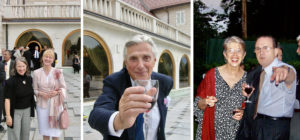
PEN International Congress Bled, Slovenia 2005. L to R: Joanne Leedom-Ackerman (PEN International Secretary), Monika Van Paemel (Belgium (Dutch-speaking) PEN), Alexander Blokh (French PEN and former PEN International Secretary), Cecilia Balcazar (Colombian PEN), Jiří Gruša (President, International PEN)
A number of the delegates had before been to Bled, home of PEN International’s annual Writers for Peace Committee conference, hosted by Slovene PEN. During the Cold War the Peace Committee, founded in 1984, provided one of the only open forums for dialogue between writers from the East and West.
“Let us learn the language of our neighbors so that we all may better come to know and understand our neighbors and forestall incomprehension and conflict,” the Peace Committee and the Congress organizers urged.
In my own address to the Congress as International Secretary, I relied on the prevailing metaphor of the bridge, using an example close to home:
I recently crossed a soaring new bridge in Boston, Massachusetts, a bridge at least 14-years in the making. This bridge spanning the Charles River was the result of what is called the Big Dig, a project anyone who has lived in or regularly visited Boston has come to think of as the Eternal Dig for it is hard to remember when a large segment of downtown wasn’t under construction. But at last there is this soaring bridge with stanchions into the sky in gracious arcs and at night a blue light shining up into its cables as it rises above the city. There is also an elaborate network of freeways and tunnels underground.
I sometimes think International PEN is a bit like the Big Dig. For much of the last decade we’ve been reconstructing ourselves, trying to reflect in our governing structures the expansion that PEN has experienced across the globe, an expansion brought on in part by the opening up of societies after the fall of the Berlin Wall and the lifting of the so-called Iron Curtain. This expansion has also been enabled by the linking of the globe through the internet. International PEN has instituted a Board, been through a long range planning process, revised rules and regulations, and while we still have construction going on and probably always will, I’m hopeful that we too will start to see more and more of the benefits of all this work…Throughout we’ve continued to witness remarkable activities from our Centers…
This year I’ve been telling people that PEN is a place where cultures don’t clash but communicate. PEN members may not always agree, in fact frequently don’t agree, but the fellowship among members can keep that disagreement from turning into confrontation. At our best PEN’s forums offer a place where the energy of competing ideas releases light, rather like that spectacular blue light which shoots upwards on the cables of the grand bridge in Boston.
Arthur Miller once described PEN: “With all its flounderings and failings and mistaken acts, it is still, I think, a fellowship moved by the hope that one day the work it tries and often manages to do will no longer be necessary. Needless to add, we shall need extraordinarily long lives to see that noble day. Meanwhile we have PEN, this fellowship bequeathed on us by several generations of writers for whom their own success and fame were simply not enough.”
The work included substance and form, the latter focusing on the organizational structure which allowed the work to go forward. At the Bled Congress the delegates approved procedural reforms, broke into workshops to discuss PEN itself and global and regional issues, and were introduced to PEN’s first Executive Director, who would begin the following month. After an extensive search, the board and staff had agreed to hire Caroline Whitaker (née McCormick) who had worked in theater development, had a degree in literature and was coming to PEN from the Natural History Museum where she was Director of Development.

Writers in Prison Committee and Workshop Sessions, PEN International Congress, Bled, Slovenia, June 2005
At the Congress seven candidates from Algeria, Colombia, Croatia, France, Finland, Japan, and Russia ran for positions on the International Board, and Mohamed Magani (Algerian PEN), Sibila Petlevski (Croatian PEN), Sylvestre Clancier (French PEN), and Takeaki Hori (Japan PEN) were elected.
The Congress discussed and passed over 20 resolutions and actions challenging the situations for writers in Algeria, Basque region of Spain, Belarus, Burma, China, Cuba, Iran, Maldives, Mexico, Nepal, Russia, Syria, Tibet, Uzbekistan, and Vietnam as well as resolutions relating to the attacks on journalists in war zones and the crackdown on internet writing in Tunisia where the World Summit on the Information Society was to be held that fall.
The Congress also noted the tenth anniversary of the death of PEN member Nigerian writer Ken Saro-Wiwa. International PEN President Jiří Gruša noted: “We are living in a time of extraordinary threats to writers and the freedom to write. In the ten years since our colleague Ken Saro-Wiwa was executed in Nigeria, hundreds of writers and journalists around the world have died by violence. Crackdowns on internet writers and anti-terrorism legislation have named writers and chilled freedom of expression in a number of countries.
“While our colleagues in countries such as Myanmar, Cuba, China and Belarus continue to struggle against conventional governmental censorship and repression, writers also face the threat of moral violence in countries from Mexico to Iraq and new pressures associated with writing and publishing on the internet.”
Among the guests at the Congress were Colin Channer, who introduced the prospective Jamaica PEN Center which was voted into PEN at the subsequent 2006 Congress in Berlin.
And for the first time since the Tiananmen Square massacre June 4, 1989, a writer from the People’s Republic of China attended as a representative of the new Independent Chinese PEN Center whose members included writers from inside and outside of mainland China. I include below much of his talk which rings truer than ever.
Wang Yi* addressed the Assembly, noting that this was the first time in 16 years “the voice of a non-official and independent Chinese writers’ group could be heard, a group that is independent or at least strives for its independence, that is free or at least longs for freedom and that tries to perpetuate the freedom of expression in the face of great political pressure…
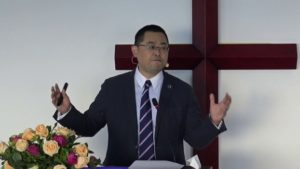
Wang Yi (Independent Chinese PEN Center)
“I come here heavy-hearted without blessing, because there is no reconciliation between a free writer, an independent intellectual, and his government. I come to Bled representing those who have been disgraced, who have stood in the shadow of terror and the peril of political oppression, and who have yet never resigned but have insisted upon their freedom of speech and writing, such as Mr. Liu Xiaobo whose work has been not allowed to be published and who has not been allowed to go abroad. I also come for myself, who experienced in the sixteen years after Tiananmen a long period during which memories have been erased forcefully and silence has been ordered. This has been a time during which mothers, who lost their sons and daughters at Tiananmen, have not been allowed to weep…
“To me and my colleagues, writing is a rescue plan for the hostage. Writing means dignity and freedom; it is kind of belief. But we cannot rescue ourselves, even when we have courage and when justice is on our side in the face of institutional arbitrariness…
“Our salvation depends upon that higher community, depends upon common universal values that we share as writers, as free people and as intellectuals. It is the source of liberty and imagination…
“We are disappointed to see that some European governments are gradually abandoning free values and lessening their criticism of the despotic regime in Beijing. For a common benefit they abandon the writers, reporters, dissidents and orators who are imprisoned…
“According to the Independent Chinese PEN club, more than 50 writers and reporters are currently in jail…
“I want to mention two points: the first one is the belief that through writing, we can enlighten and preserve basic human values. Second, there is a global realistic linguistic environment. These two points make me think that the persecution of Chinese, Tibetan, Uighur and other minority writers reaches across borders to become an international issue…There is only the suppression of the right to freedom of expression and the persecution of human beings, which needs to be rooted out, and the victim needs to be consoled and supported…
“The Chinese government’s suppression of writers has accelerated in recent years, since the beginning of the Internet era…pen names and pseudonyms are prohibited. With this act, the last bastion of self-protection is destroyed.
“Every morning, the Communist Party’s propaganda department issues a list of prohibited news to the media. Whoever dares to break the taboos will get into big trouble. As the government stifles the mouths of the media and betrays the public, it also tampers with the truth in historical textbooks and deceives the children in school. An increasing number of courageous writers, reporters and public figures are daring to challenge the status quo so more and more of them have been thrown into jail on charges of committing the crime of “instigation and subversion of the state” or “disclosing state secrets” to “hostile forces…
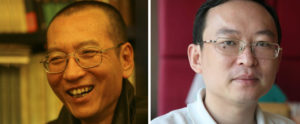
Liu Xiaobo and Yu Jie (Independent Chinese PEN Center)
“Among the harassed and persecuted are also the president of ICPC and his deputy, Mr. Liu Xiaobo* and Mr. Yu Jie*. Under such circumstances, you cannot but regard the Chinese writer as a hostage…
“I come to Bled hoping to present myself as a writer, but I am indeed only a hostage…One of the reasons that I definitely wanted to come is that I believe we all belong to the same world. In this world, the state, the glory and the lawful right all belong to that higher spiritual origin that makes us, without regret, proud to be a writer.”
*[Wang Yi, deputy Secretary General of ICPC 2003-2007, has been imprisoned in China since December 2018, serving a 9-year sentence for “activities disobedient to the government control” and “inciting subversion of state power and illegal business.” Wang Yi is a writer and a Christian pastor. Liu Xiaobo, the second President of ICPC, was sentenced in December 2008 to an 11-year prison sentence as “an enemy of the state” for “incitement of subverting state power.” He was the first Chinese citizen to win the Nobel Prize for Peace in 2010 and died in custody June 13, 2017. Yu Jie, a celebrated writer, was one of the drafters, along with Liu Xiaobo, of Charter 08, which set out a democratic vision for China; he was arrested and tortured in 2010 and immigrated to the U.S. in 2012. He is author of Steel Gate to Freedom: The Life of Liu Xiaobo.]
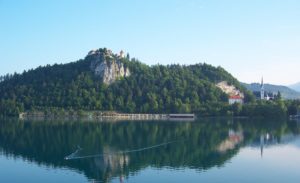
Lake Bled, Slovenia, site of PEN International 71st World Congress, 2005
Next Installment: PEN Journey 38: PEN’s Work On the Road in Kyrgyzstan and Ghana
PEN Journey 36: Bled: The Tower of Babel—Part One
PEN International celebrates its Centenary in 2021. I’ve been active in PEN for more than 30 years in various positions and now as an International Vice President Emeritus. With memories stirring and file drawers of documents and correspondence bulging, I am a bit of a walking archive and have been asked by PEN International to write down memories. I hope this personal PEN journey will be of interest.
In pulling out papers from 2005 of PEN conferences and the 71st World Congress, I came across two documents that told a very human story in PEN and a coincidence of life that I share here:
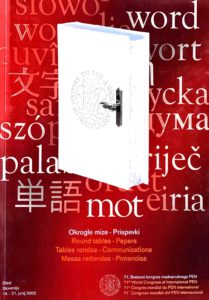
71st PEN World Congress 2005, Bled, Slovenia, Round Table Papers
The first paper I skimmed was a talk I’d given as PEN International Secretary at the Translation and Linguistic Rights Committee Conference in Ohrid, Macedonia in September 2005; the paper included the testimony of a PEN member at the end. The second text I read was from the Round Table Papers of the PEN Congress a few months before, in June 2005. This paper was on the Congress theme Tower of Babel: Blessing or a Curse? The paper was the first in that publication and was written by celebrated Nigerian poet Niyi Osundare who speculated on what the world would be should there be just one language and then meditated on what in fact the world was. Shared below are excerpts from Dr. Osundare’s paper, “The Blight and Blessing of Babel:”
“A one-language world would be too simple, too linguistically neat, too unrealistic. And, I daresay, too unnatural. For everywhere in nature there is a tendency towards fission and mutation on an intra-and inter-generic basis. Variety is not only the sauce of life; it is also its source…
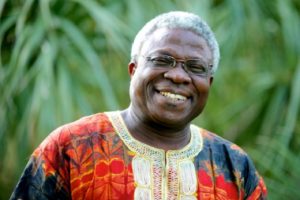
Nigerian poet Dr. Niyi Osundare
“Yoruba culture (the culture in which I was born and raised, and one that I know best) understands the necessity of diversity and inevitability of varieties in different aspects of human life. Hence the saying “Mee l’Oluwa wi” (Many, says the Lord) and “Ona kan o w’oja” (There are countless routes to the same market), both of them short, handy variations on a longer proverb “Oju orun t/egberun eye fo lai farakanra (The sky is wide enough for a thousand birds to fly without colliding). Corroborating this pluralist perspective is the folktale about the Tortoise, ever cunning and self-centered, who one day decided to capture all the wisdom in the world and seal it up in one pot for his own use in an effort to become the wisest being in the world. Of course, his project ended up in a laughable disaster as his pot fell to the ground and exploded while different fragments of the imprisoned wisdom dispersed in different directions, free for all, unmonopolisable. In an essentially pluralist Yoruba worldview, phenomena exist by mutual definition; a thing, a person loses its sense of proportion when there is nothing else to compare it with. The trajectory of life hardly ever follows one straight and narrow path; it must confront the crossroads, experience the thrills and tortures of decision and indecision, before arriving at the juncture of choice. And for the act of choosing to take place, there must be more than one…
“Literature (and the arts generally) is, no doubt, a powerful weapon in the struggle against the blight of Babel. By endowing our airy thought with that ‘little habitation’ and ‘name’ (hail Shakespeare, one of the supreme healers of the wounds of Babel), by generating universal sympathies, globalizing the particular and particularizing the global, by producing that music of the spheres whose winds stir the eaves in different lands, by evoking images which touch hearts across cultures, by articulating those humane values that are essential to human freedom everywhere in the world, by constantly lifting the human spirit and enriching, interrogating human reality with the supple possibilities of fiction…literature strives to restore some of the lost potentialities of Babel. For every significant writer is a bridge-builder of a kind, a witness, a participant-observer, an advocate of a truly humane future.
“No doubt, the phenomenon of Babel has left its fragmentations and dispersals. But it has also bequeathed to humanity a panoply of sounds and letters, an astounding (even if confounding) array of tongues which challenges the tyranny of uniformity and monotony of methods. It has necessitated the building of bridges across diverse tongues and cultures, these bridges being, in a way, a horizontal alternative and antidote to the vertical impossibility of the Tower itself.”
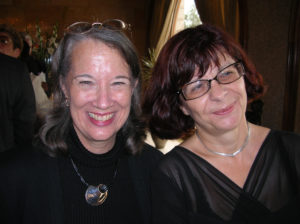
L to R: Joanne Leedom-Ackerman (PEN International Secretary) and Kata Kulavkova (Chair PEN Translation and Linguistic Rights Committee)
Dr. Niyi Osundare, a Nigerian PEN member, had moved to New Orleans for specialized education for one of his daughters and was also a member of the African Writers Abroad PEN Center. Recounted here is my talk to the Translation and Linguistic Rights Committee a few months after the Bled Congress, in September 2005. Only as I recently read the end of my paper did I grasp the connections and the range of PEN’s reach and work. My observations at the time:
The theme of the 8th Ohrid P.E.N. Conference—Writer Within and Without a Homeland—struck a particularly sonorous chord as I was preparing to come here.
In the U.S. the question of homeland has been on the national consciousness for the past month as one of America’s most diverse and multi-lingual cities—New Orleans—has literally disappeared. Its population evacuated as the city sank into the waters of the Gulf of Mexico. A large portion of the Gulf coast also fled in the face of Hurricane Katrina. Over a million people dispersed throughout the land in one of the largest displacements in the nation’s history. Many will never return to their homes.
In Europe and Africa, Asia and Latin America even larger displacements have occurred in the last century, often because of war, famine, politics, and also weather. All of us remember the disappearance of towns and villages and whole sections of coasts in the countries hit by the tsunami last December.
When a home is suddenly gone, family scattered, livelihood and career and ambitions all uprooted, one is forced to consider what endures, and what one can take with him. Home moves from a physical place to a place in consciousness.
The ability to speak with others and to tell the story is especially important and makes the idea of language as homeland compelling, also imagination as homeland, literature and art as homeland, and particularly relevant to PEN, a community of fellowship as homeland.
I’d like to read a message to PEN’s Africa Writers Abroad Centre from a Nigerian writer trapped in New Orleans:
This is my first real internet access since the disaster struck…I can’t thank you enough for your concern and care. It’s been all so overwhelming. My wife and I are alive and, after passing through five horrendous “evacuation centers”, have been allocated to the Red Cross shelter in Birmingham, Alabama. The nightmare of the past seven days is simply unimaginable. We very narrowly escaped drowning in our own house. Pursued by an 8-foot high toxic flood water (15 feet in the street outside our door), we were forced up a stuffy, airless attic, where we were holed up for 26 hours, with no food, no water, no prospect of any rescue. We were only saved by the fortuitous intervention of a neighbor who heard our shout for help when he came round with his rescue boat to pick up something from his own house. With life vests provided by him, we managed to swim out of our house, leaving everything we had behind. Right now, all our clothes, books, academic and professional credentials, travel documents, computers, manuscripts, etc are submerged in the dirty waters of the New Orleans flood. Hell has no other name… We deeply appreciate your concern. Kindly pass on our gratitude to all on your list serve.
Yours in the Eye of the Storm
[Niyi Osundare]
I’m told he has been overwhelmed by the outpouring of concern. While the concern and offers of assistance can’t replace what was lost, it can fill in some of the spaces in the heart.
In the U.S. those displaced are at least relocated in the same country and for the most part speak the same language, though the difference in accents has its challenges. What has been heartening has not been the help of government agencies, but the outpouring of citizens in communities all over the nation and abroad. One would wish this empathy would prevail and continue.
The ability to imagine and to reach out to another and try to see from the other’s point of view is one of the elements of great literature and also of great people. This empathy is a value around which PEN has developed and one which PEN at its best embodies.
A community spread across 99 countries, shaped by different nationalities, cultures, races, religions, and languages, PEN is a fellowship of writers who appreciate the importance of telling a story and defend the writer’s freedom to tell it as he sees it and to tell it in the language of his choosing. Language is the writer’s tool, expressing the music of his thoughts and sounding the chords of his imagination.
Language, imagination and fellowship—all are a kind of homeland that can survive the elements and can even survive politics and war, a homeland, one of whose addresses we like to think is at P.E.N.
Dr. Osundare and I didn’t know each other at the time though perhaps met briefly at the Bled Congress which was attended by more than 275 writers. I know many of his colleagues from Nigerian PEN and at the time from the African Writers Abroad PEN. I made the connection only as I reviewed the papers. Dr. Osundare is now a professor at the University of New Orleans.

Delegates at PEN International World Congress, Bled, Slovenia, June, 2005. L to R: Remi Raj (PEN Nigeria), Dan Kayhana (PEN Uganda), Frankie Asare Donkoh (PEN Ghana), Alfred Msadala (PEN Malawi)
Next Installment: PEN Journey 37: Bled: The Tower of Babel—Part Two
PEN Journey 14: Speaking Out: PEN’s Peace Committee and Exile Network
PEN International celebrates its Centenary in 2021. I’ve been active in PEN for more than 30 years in various positions and now as an International Vice President Emeritus. With memories stirring and file drawers of documents and correspondence bulging, I am a bit of a walking archive and have been asked by PEN International to write down memories. I hope this personal PEN journey might be of interest.
With a blue glacial lake surrounded by the Alps, a small island in the center with an ancient church with a Wishing Bell that rang out and promised fulfillment for the wishers, with a castle perched atop a hillside—with beauty and history intertwined through the landscape, Bled, Slovenia offered a stunning venue for PEN International’s Peace Committee meetings.
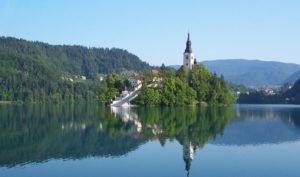
Bled, Slovenia
In the heart of Europe, the Peace Committee sat in the heart of a contradiction, for there were few places less peaceful than the Balkans. Yet Slovene PEN members played an important role as did other PEN members in bridging divides among writers in conflict zones.
At the Peace Committee’s inception in 1984, Slovenia was part of Yugoslavia, one of a handful of Communist countries after World War II whose writers were able to sign PEN’s Charter which endorsed freedom of expression. The other countries included Poland, East Germany, Czechoslovakia, Bulgaria, and Hungary. In 1962 a well-known Slovene writer, who was a member of English PEN but returned each year to Slovenia, championed the idea of resurrecting the Slovene PEN center which had existed before the war as well as the other two Balkan PEN Centers—Croatia and Serbia.
In 1965 writers from these Yugoslav centers took on the task of staging an International PEN Congress in Bled. At the congress Arthur Miller presided as the first and only American President of International PEN. At the ’65 Bled Congress PEN also hosted for the first time Soviet writers as observers. “Almost despite myself I began feeling certain enthusiasm for the idea of international solidarity among writers, feeble as its present expression seemed,” Miller wrote in his autobiography Timebends. “…I knew that PEN could be far more than a mere gesture of goodwill.”
It took almost 25 years before a Soviet, and later Russian, PEN Center emerged. [see PEN Journey 3, 6, 8] During the Cold War it was difficult for writers from the East and West to communicate, but at PEN congresses and meetings and at the Peace Committee, writers debated, exchanged ideas and shared literature. The Peace Committee became a haven during the Balkans War and also a meeting ground for writers from other conflict areas.
Unlike the Writers in Prison Committee which worked to protect and liberate individual writers, it was difficult at times to define the concrete actions the Peace Committee could take, but at least three stand out in my memory—one direct action, one initiative and one rigorous debate on a pressing issue.
As noted in an earlier post [PEN Journey 7] the head of Slovene PEN, Boris Novak ran the barricades during the Balkans War with aid for writers in the besieged Sarajevo as did Slovene poet and future Peace Committee Chair Veno Taufer and others. At the Peace Committee meeting in 1994 Boris reported 100,000 DEM ($60,000) had been contributed from PEN centers around the world and delivered to almost 100 Bosnian writers in order to save lives. When a new Bosnian center was elected at PEN’s Congress in late 1993, the Bosnian center began taking over the delivery of aid, and Boris was elected chair of the Peace Committee.

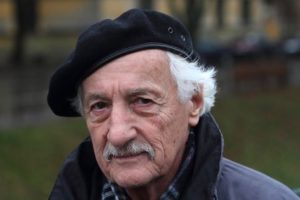
Boris Novak. Photo credit: The Bridge Magazine Veno Taufer. Photo Credit: Alchetron
I attended my first Peace Committee Conference as Chair of PEN’s Writers in Prison Committee in 1994 at the midway point of the Sarajevo siege. At the time PEN was also being asked to help writers who managed to get out of the city. In London I’d met one of these Bosnian writers and gave him my son’s old computer which he accepted as if I’d given him the keys to the city for he had no means to write. Writers fleeing not only the Balkans but situations in Africa and the Middle East needed support as they landed in new locations. It was at the Peace Committee meeting in 1994 that PEN’s Exile and Refugee Network was first conceived in partnership with the Writers in Prison Committee. The initiative was confirmed at the PEN Congress later that fall in Prague.
This initiative for exiles and refugees moved into an exploratory phase which became a leit motif in PEN’s work over the next two decades as it had been in the decades past. PEN’s Exile Network, spearheaded by PEN Centers, including Canada, Sweden, Norway, Germany, Belgium, England, America and many others took the initiative and offered residencies, aid and services to refugee and exiled writers arriving in their countries. Eventually PEN International formed a partnership with the expiring Parliament of Writers Cities of Asylum. In 2006 PEN became a founding member of ICORN—International Cities of Refuge Network. [More in future blog post]
The following year in 1995 the Peace Committee meeting in Bled featured a debate on hate speech, seen as both cause and effect in the conflicts. The gathering included such intellectual luminaries as Adam Michnik, an architect of Poland’s Solidarity movement and editor of the leading newspaper Gazeta Wyborcza in Warsaw. The debate was lively over the incendiary nature of hate speech and the limitations that should be imposed. Both in the Balkans War and in the civil war in Rwanda, which had just ended the year before, hate speech and writing fueled the strife. In spite of PEN’s advocacy for free expression, PEN also called on its members “to use what influence they have in favour of good understanding and mutual respect between nations and people” and pledge “to do their utmost to dispel all hatreds.” Even as “PEN declares for a free press and opposes arbitrary censorship,” it recognizes “freedom implies voluntary restraint” and members pledge “to oppose such evils of a free press as mendacious publication, deliberate falsehood and distortion of facts for political and personal ends.”
The very Charter of PEN contained the axis of the debate. What were or should be limits on expression? Should PEN take a position? At the 1995 Peace Committee conference and in debates since, the views tended to fall according to cultural and national experience. Those in Europe, Africa and elsewhere who had experienced effects of hate speech urged stricter limitations on speech; whereas Americans, bred on the First Amendment of the U.S. Constitution, remained wary of limits and argued that the answer to offensive speech was more speech, the drowning out of harmful ideas with inspiring ones. In my notes of the meeting and debate that year, I find no consensus or clear recommendation except for a reminder from one speaker who knew and quoted Russian exile and dissident Aleksandr Solzhenitsyn: “Don’t go against your conscience and don’t tell lies!”
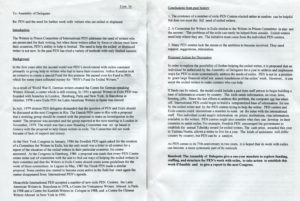
Proposal at 61st Congress for PEN to explore setting up an Exile Network. Resolution passed.
Next Installment: PEN Journey 15: Speaking Out: Life and Death